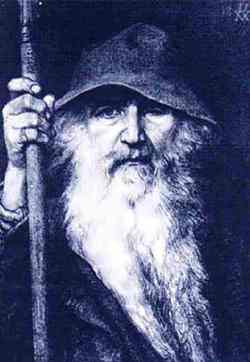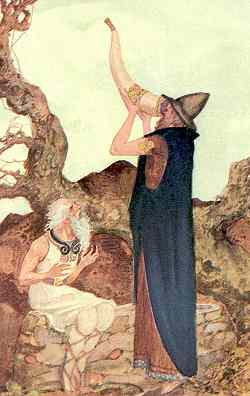
|

|
Óðin
 Óðin
is the greatest of the Æsir. He is the one-eyed god of wisdom,
and poetry, and of battles and the slain. He is the patron of
warriors, rulers, and poets. He is the lord of hosts and the god of inspiration.
Óðin
is the greatest of the Æsir. He is the one-eyed god of wisdom,
and poetry, and of battles and the slain. He is the patron of
warriors, rulers, and poets. He is the lord of hosts and the god of inspiration.
 Óðin's
thirst for knowledge drives his actions in many of the myths. He became all-wise by drinking from Mímir's
fountain, at the cost of one of his eyes. He impaled himself with
his spear on Yggdrasil, the tree of life, for nine days to learn
the secrets of writing (runes). He is Alföður (all father),
father of many of the Æsir, and creator of the first man
and woman. He won the mead of poetry from the giants at
Jötenheim, and occasionally shares it with men of Miðgarð.
In his hall, Valhöll, he entertains the special chosen of
the slain warriors who are to battle at his side at Ragnarök.
From his high seat Hliðskjálf in his hall Valaskjálf,
he can survey all that happens in all the nine worlds. His ravens
Huginn (thought) and Muninn (memory) fly out into the world every
morning and return at nightfall to whisper into Óðin's
ears all the news they have seen and heard. Óðin rides
the eight-legged horse Sleipnir, and carries the spear Gungnir. He is recognized
by his floppy hat and long cloak.
Óðin's
thirst for knowledge drives his actions in many of the myths. He became all-wise by drinking from Mímir's
fountain, at the cost of one of his eyes. He impaled himself with
his spear on Yggdrasil, the tree of life, for nine days to learn
the secrets of writing (runes). He is Alföður (all father),
father of many of the Æsir, and creator of the first man
and woman. He won the mead of poetry from the giants at
Jötenheim, and occasionally shares it with men of Miðgarð.
In his hall, Valhöll, he entertains the special chosen of
the slain warriors who are to battle at his side at Ragnarök.
From his high seat Hliðskjálf in his hall Valaskjálf,
he can survey all that happens in all the nine worlds. His ravens
Huginn (thought) and Muninn (memory) fly out into the world every
morning and return at nightfall to whisper into Óðin's
ears all the news they have seen and heard. Óðin rides
the eight-legged horse Sleipnir, and carries the spear Gungnir. He is recognized
by his floppy hat and long cloak.
Óðin's character is far more complex than any of the other gods, and that complexity is mirrored by the long list of names used by Óðin: Alföðr (Father of All), Valföðr (Father of the Slain), Hangaguð (god of the Hanged), Haptaguð (god of Captives), Farmaguð (god of Cargoes), Hár (High One), Grímr (Hooded One), Svipall (Changeable), Hnikarr (Inflamer), Báleygr (Fiery Eyed), Bölverkr (Evil Doer), Viðurr(Destroyer), Yggr (Terror), Veratýr (god of Men), and even Jálkr (Gelding). The names show the many sides of Óðin, as a god of war, a giver of victory, a sinister and terrifying god, and a god who can not be trusted. The name of Jálkr probably refers to the fact that Óðin practices seiðr, a powerful but unseemly and effeminate magic that calls into question his masculinity.
On at least one occasion, Óðin is known to have broken a ring oath, the most sacred and inviolable promise conceivable to a Norseman. That act is perhaps the most significant of the missteps that have led the gods from the carefree early days of the golden era to the turbulent times of the present recorded in the Norse myths.
Óðin is notable for revoking his favor from a warrior in the heat of battle, resulting in the death of the fighter. Óðin defends his actions by saying that he needs the best warriors with him at Valhöll in Ásgarð, to fight at his side at Ragnarök. Again and again, the stories show that Óðin is not to be trusted. While he can be generous with treasures and wise counsel, he can also be treacherous, and capricious. He routinely uses deception, misdirection, and seduction to achieve his aims.
The common man looked upon Óðin with
respect, rather than love; only the high born chose to embrace
him.
|
|
©1999-2026 William R. Short |